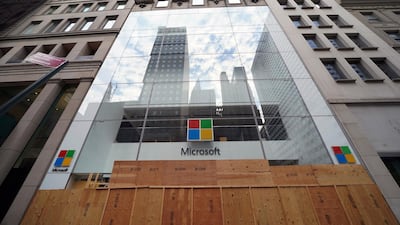Microsoft will permanently close all of its 83 retail stores globally and completely switch to online sales channels, the company said.
The closure of the physical stores will result in a pre-tax charge of nearly $450 million (Dh1.65 billion), or $0.05 per share, in the current quarter ending on June 30, the company said. This includes asset write-offs and impairments.
“The past months have been extraordinary … amidst the challenges, our team has focused on how we can continue to serve our customers,” said David Porter, corporate vice president of Microsoft Store.
“Our team has proven success serving customers beyond any physical location.”
Besides product sales, Microsoft's stores offered users a place to try out Windows-run PCs, Xbox consoles and various third-party computers and phones. The company said it would keep physical locations in New York, Sydney, London and at its Redmond campus in Washington, which it will convert into experience centres. They will showcase new technologies but will not sell anything.
The company’s physical stores had been temporarily closed on March 17 because of the coronavirus outbreak. Since then, the company said its retail team had hosted more than 14,000 online workshops and summer camps, training hundreds of thousands of enterprise and education customers on using remote work and learning software.
Microsoft first announced its plans to open physical stores in February 2009 – a move that was considered a challenge to Apple’s retail stores. It has 72 stores in the US, seven in Canada and one each in the UK, Australia, Puerto Rico and Finland.
Microsoft-owned Windows is one of the most widely-used operating systems in the world. The tech company said it had seen strong growth of traffic to Microsoft.com and its digital Xbox and Windows storefronts, reaching up to 1.2 billion monthly customers in 190 markets in the past few months.
The company is also offering virtual product demos, customer support, online tutorials and workshops to support online sales.
“We will continue to invest in digital solutions, including new services such as one-to-one video sales support,” Mr Porter said.
The company has not announced any layoffs as a result of the store closures.
“We deliberately built teams with unique backgrounds that could serve customers from anywhere … [it] ensured we could continue to serve customers of all sizes when they needed us most, working remotely these last months.
“Our commitment to growing and developing careers from this talent pool is stronger than ever.”
Closing physical stores is a “tough, but smart strategic decision” by Microsoft, Wedbush Securities analyst Daniel Ives wrote in a note to clients.
“The physical stores generated negligible retail revenue … and ultimately everything was moving more and more towards the digital channels over the last few years."
Earlier this month, Microsoft opened an artificial intelligence centre for energy in Dubai to experiment with technologies that could be used globally.


